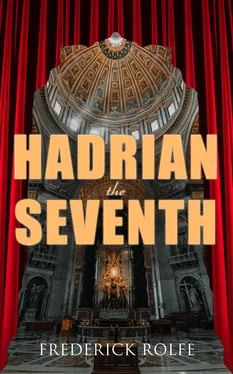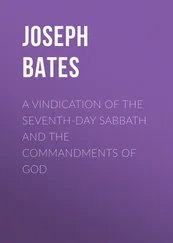Consequently, when (during March and April) a score or so of these good gentlemen found themselves in Rome, with the doors of the Conclave bricked-up in their faces, the windows boarded and canvas-covered, and even the chimneys (with one exception) capped, they knew no better than to curse quite quietly all to themselves, to say that nothing was happening because they could not see what was happening, and to write dicaculous descriptions of the crowd, and the seven puffs of smoke (which on seven separate occasions distracted the said crowd), in the square of St. Peter's.
For, if there be one place in all this orb of earth, where a secret is a Secret, that place is a Roman Conclave. It is due to the superlative incompetency of the spies. Ignorant of their subject, they cannot seize its saliencies: they cannot move a hair's breadth out of their conventional groove, notwithstanding that common sense should teach them the imperative necessity for applying unconventional methods to unconventional cases. When once we have emerged from the banal blinding stifling paralysing obfuscation of the nineteenth century (and that should be in about ten years' time), it will be obligatory for "Our Special Correspondent" to add to things of his professional apparatus. The first is the power of mind-projection, as well as that other power of will-projection which, already, up-to-date practical common-sense men-of-the-world like the Jesuits use to such advantage. The second is a round matter, of about two-pounds-ten-ounces' avoirdupois weight including its black-velvet wrapper, which costs forty-two pounds-sterling at the mineralogists' in Regent Street.
Table of Contents
Well: this is what was happening in the Roman Conclave.
Cursors had shouted "Extra omnes": fifty-seven cardinals and three-hundred-and-eleven conclavists had been immured in three galleries of the Vatican. All the ceremonies ordained in 1274 at the Council of Lyons by the Bull of Gregory X. had been observed.
The Sacred College was divided into factions. There were five candidates for the paparchy:— Orezzo, Serafino-Vagellaio, cardinal-bishops: Ragna, Gentilotto, Fiamma, cardinal-presbyters. Then came groups representing divers nationalities. The French were Desbiens, Coucheur, Lanifère, Goëland, Perron, Mâteur, Légat, Labeur, cardinal-presbyters; and Vaghemestre, cardinal-deacon. The Germans were Rugscha, Zarvasy, Popk, Niazk, cardinal-presbyters. The Spaniards were Nascha, Sañasca, Harrera, cardinal-presbyters. The Erse were O'Dromgoole, O'Tuohy, cardinal-presbyters. The Italians were Moccolo, Agnello, Vincenzo-Vagellaio, cardinal-bishops: Sarda, Ferraio, Saviolli, Manco, Ferita, Creta, Anziano, Cassia, Portolano, Respiro, Riciso, Zafferano, Mantenuti, Gennaio, Bosso, Conella, del Drudo, di Petra, di Bonti, cardinal-presbyters: Macca, Sega, Pietratta, Pepato, della Volta, cardinal-deacons. The English and American cardinal-presbyters Courtleigh and Grace agreed to vote together: so did the Benedictine cardinal-presbyter Cacciatore, and the Capuchin and Jesuit cardinal-deacons Vivole and Berstein. The Portuguese cardinal-prior-presbyter Mundo, and the Bohemian cardinal-presbyter Nefski (who was carried in a litter) posed as independent voters. Cardinal-presbyter Capacitato was absent through the infirmities of age; and, as common report (to say nothing of common knowledge) credited him with the possession of the Evil Eye, Their Eminencies were thankful to think that the fingers, which they would need for inscribing their suffrages, need not be employed in making perpetual horns.
Once walled-up, and the conclavists having been satisfied about their comical constitutional privileges, the cardinals spent the evening in visiting one another in their cells, in discussing the prospects of the five candidates, in canvassing for and promising suffrages. The five themselves were divided into two parties which Ferraio, who was a bit of a wag, denominated in an abstruse jest the Snarlers and the Mewers. A Roman tradition alleges that the letter R (the litera canina) exercises an indefinable influence over an election, in that it occurs in the family names of alternate pontiffs. Others declared this tradition to be grounded upon no more sure warranty than old wives' fables (anicularum lucubrationes), Serafino-Vagellaio, Gentilotto, Fiamma, gave expression to that theory. Circumlocution aside, there was little to choose between the five. Luigi Orezzo was Cardinal-Bishop, Dean of the Sacred College, Chamberlain of the Holy Roman Church. Mariano Ragna was Secretary of State. Serafino-Vagellaio had been the favourite of a pontiff who had had all the world from which to choose. Hieronimo Gentilotto, nicknamed "The Red Pope" because he was Prefect of the Society for the Propagation of the Gospel in Foreign Parts, only had the Successor of the Fisherman as his superior. Domenico Fiamma, Archbishop of Bologna, was in the prime of vigorous life and famous for his brilliant intellect and noble mind.
A cardinal is prohibited from voting for himself. Orezzo promised his suffrage to Ragna: Ragna, his to Orezzo: Snarlers should snarl at each other. Serafino-Vagellaio also promised his suffrage to Ragna, having the idea that an official is worthy of observance. But Gentilotto supported Fiamma: and Fiamma, Gentilotto.
Morning saw mass and communion in the Pauline Chapel, and Their Eminencies proceeding to their thrones in the Xystine Chapel. A long silence came to pass. Fat wax tapers glimmered on the altar, on the screen, on the desk before each throne. So the cardinals waited, smoothing violet robes and the white uncovered rochets which indicated that supreme spiritual authority was devolved into their hands. No one was moved to speak. Election was not to be accomplished by the Way of Inspiration.
Masters-of-ceremonies placed, on the table before the altar, two silver basons containing little paper billets. The names of the fifty-seven cardinals were written each on a little snip of parchment. The snips, rolled up, were tucked in holes in fifty-seven lead balls. The balls were dropped into a huge violet burse, one by one, counted by the electors. The burse was well-shaken; and Vaghemestre drew out three. The first bore the name Moccolo: the second, Popk: the third Harrera. Thus were elected the Cardinal-Scrutators.
In turn, each cardinal provided himself with a blank billet from the silver basons: retired to his desk: and set about recording his suffrage. At the top of the billet, he wrote "I, Cardinal" and his name: folded it over: sealed it at each side. At the bottom he wrote his motto: folded it over: sealed it at each side. In the middle, he wrote "elect to the Supreme Pontificate the Most Reverend Lord my Lord Cardinal" and the name of the candidate to whom he gave his suffrage. Scratching of quills, splashing of scattered pounce, punctuated momentous silence. In obedience to the Bull of Gregory X., some made efforts to disguise their script. The results were hideous. Last, all folded their billets to about the breadth of an inch; and, in turn, each cardinal approached the altar, alone, holding his suffrage at arms' length between the index and middle fingers of his right hand: bent his knee: rising, swore "I attest, before Christ, Who is to be my judge, that I choose him whom I think fittest to be chosen if it be according to God's will." A great gold chalice covered by a paten stood on the altar. Each cardinal laid his suffrage on the paten: tipped it until the suffrage slid into the chalice: replaced the paten; and returned to his throne.
Cardinal-Scrutator Moccolo took the chalice by the foot: placed one hand on the paten: and shook, thoroughly to mix the suffrages. The Cardinal-Dean, the Cardinal-Prior-Priest, and the Cardinal-Archdeacon brought down the chalice to the table from which the billet-basons now had been removed. A ciborium stood there. The three Scrutators sat at one side of the table in face of the Sacred College. Harrera counted the suffrages, one by one, from the chalice into the ciborium. There were fifty-seven. A grateful sigh went up. A hitch would have invalidated the scrutiny, giving Their Eminencies the pains of voting and sealing and swearing over again. Moccolo drew out one suffrage: unfolded it without violating the sealed ends: discovered the name of the candidate to whom the vote was given; and passed it to Popk, who also looked at the name; and passed it to Harrera, who read the name aloud.
Читать дальше











